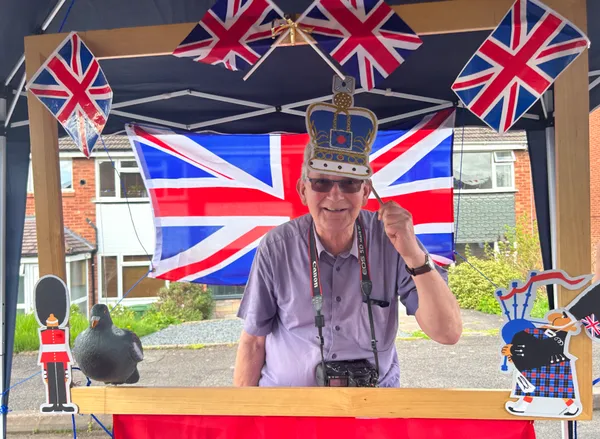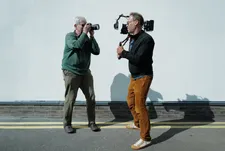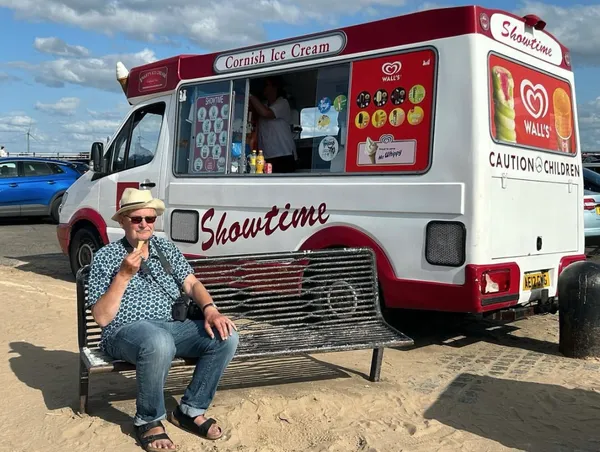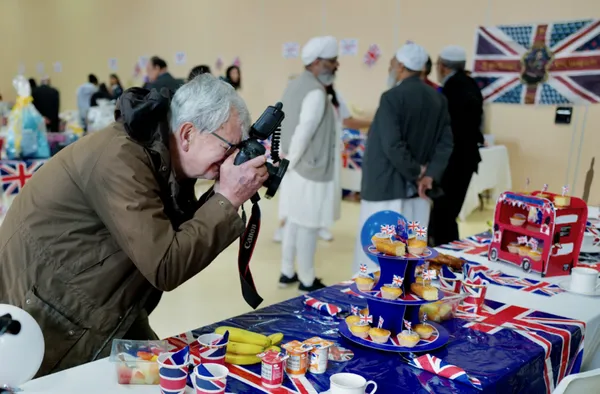 |
| Putting the Great into Britain - Martin Parr captured by Lee Shulman Photo: Lee Schulman |
The tables have been turned on celebrated photographer Martin Parr, now 72, and a much-acclaimed chronicler of British society and foibles over the decades who first came to international attention with his series The Last Resort.
It was shot over three summers on the litter-strewn beaches of New Brighton (near Liverpool) and attracted a fair bit of controversy at the time – he was accused of “exploiting” his working-class subjects.
He chalks it all up to experience and takes a certain relish in now being considered as a respected and established figure with his own Foundation and archives in Bristol (open to the public since 2017) and as President of Magnum Photos International since 2013.
 |
| Through a lens playfully: Martin Parr, left, and filmmaker Lee Schulman Photo: Lee Schulman |
Parr has become the title subject of Lee Shulman’s documentary I Am Martin Parr which is why we’re meeting in a hotel de luxe off the Avenue des Champs-Elysées in Paris as part of the UniFrance Rendez-vous with French Cinema (the film is a collaboration between French outfit Haut et Court and the UK’s Dogwoof).
How does it feel to be on the receiving of a lens? He and Shulman have just had a session with UniFrance event photographer Marie Rouge. “I’m fine with being photographed because it happens to me a lot. I think it’s worse for the photographer taking the shots, to be honest.”
Parr has remarkable endurance given that in 2021 he was diagnosed with myeloma, a form of cancer. This means he cannot stand for more than ten minutes without pain. He moves with the assistance of a discreetly parked rollator mobility device. It accompanies him wherever he goes. He leaves it behind temporarily for any shoots and then comes back to it. On the initial diagnosis he thought it his time was up but treatment and drugs enable him to continue. His take on the situation as previously quoted is: “I’m OK. I’m perfectly normal, I think.”
Ask him for his photographic influences and he will always cite his paternal grandfather George who was a member of the Royal Photographic Society. He gave him a camera and inspiration when he was just 11 at which point he knew this was his destiny with later studies to follow at Manchester Polytechnic. Although brought up in the Sixties in a suburban setting in Surrey his affection for the North of England and its sense of community remains strong and with his wife Susie he has settled in the Wirral.
 |
| Martin Parr takes and ice-cream break. Lee Schulman: 'When we were making the documentary, we kept losing him all the time.. he is a sort of Mr Everyman' Photo: Lee Schulman |
The other influences were such American photographers as Robert Frank, Lee Friedlander, and the British born Tony Ray-Jones who moved to New York in the Sixties. “I came across his work when I went to college. He made a deep impression on me. It was sad he died so young [age 31 in 1972] because obviously he was such a talent.” Besides Parr Ray-Jones' subjective and artistic approach to photography influenced others in a new generation of independent photographers emerging in 1970s Britain including Daniel Meadows, Chris Steele-Perkins, and Simon Roberts. He also admits to a sneaking admiration for Henri Cartier-Bresson despite the two of them having a factitious run-in.
“He was always against me joining Magnum. By the time I came to join, however, he was no longer a voting member. He came to show I had put on in Paris in 1996 and he got really angry by my pictures and said they were like some kind of tourist show. He wrote me a fax that night saying ‘I don’t know much about you but it looks like you come from another planet.’ When I got the fax I was very excited and wrote back to him saying I understand your viewpoint but ‘Why shoot the messenger.’ There was a whole show at the Cartier Bresson Foundation around this encounter and it’s become quite a famous story in my annals.”
I wondered if Cartier-Bresson’s fly-on-the-wall style appealed to Parr. “People say I am almost invisible but that is not something I have tried to do myself,” he smiles.
Shulman chips in: “I would say Martin is invisible. When we were making the documentary, we kept losing him all the time. He has this kind of camouflage – he is a sort of Mister Everyman. That is the thing about good photographers, they kind of melt into the background. But Martin does also have this tendency to go up to people and introduce himself as well.
“He seemed to have complete confidence in me which is rare, and he did not interfere but let me get on with it. There is a trust there and I know if he didn’t like anything he would tell me. He is very honest about things.”
The pair first met at an exhibition in Arles, the Provençal town much viewed in paintings by Van Gogh and Picasso and the home of an annual focus on the art of photography. “He talked about his influences and I talked about mine and the way that art has this habit of mingling with life. We put together a book which also resulted in an exhibition. And we also got to know each other really well. The documentary was a natural result of our friendship. So I kidnapped him and put him a van and went around the UK to the places I knew so well from his photographs. Martin loses himself in his work which makes him very free as a person. I like the way he works, takes no prisoner and does exactly what he wants to do.”
What the ingredients for a good image? Parr muses and pronounces: “I am looking out for contradictions that I may feel and might be evident, and to make it work visually. It has to be strong graphically. And hopefully any resonance of meaning or ideas will be there for the viewer to take away or discover but I am not guaranteeing that anyone will do that.”
 |
| Cupcakes ready for their close-up by Martin Parr. 'I am looking out for contradictions that I may feel and might be evident, and to make it work visually' Photo: Lee Schulman |
This autumn Parr has his autobiography due for publication, written with his wife Wendy Jones and hotly contested in the literary world. Demonstrating his wry sense of humour it is titled: “Utterly Lazy and Inattentive” which was a quote from one of his school reports.
Through his publishers Penguin Books Parr has said: “'I’ve published over 130 photobooks on many different subjects, from seaside resorts to smoking. This is the first and only time I’ll publish a book about myself. My autobiography is a combination of stories and photos taken from across my life - from my earliest snapshots to the work I’m doing now. It was a way for me to understand my progress as a photographer: to see what has changed, and what has stayed the same, both in my work and in the world. It has allowed me to see how everything is connected.”
I Am Martin Parr will have a special preview screening in his presence accompanied by Lee Shulman on 19 February at Curzon Soho and also on 20 February at Bristol Watershed. The film is released in cinemas in the UK and Ireland from 21 February.
























